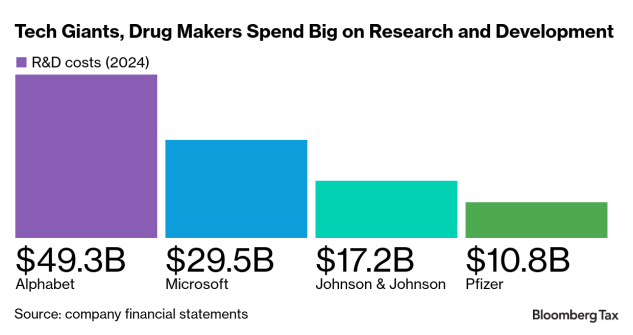Giant US tech and drug companies that lobbied for a major new tax break on research and development costs stand to save billions a year from it.
The change, part of Republicans’ tax-and-spending law enacted this month, allows companies to deduct their domestic R&D costs immediately instead of stretching them over five years. That benefits companies like
Republicans and Democrats have backed the change, and advocates say it’s needed to spur US investment and economic growth and help US companies compete globally.
”We think it’s going to translate to more immediate investment in the United States,” said Tim Monahan, vice president of government affairs for the US Chamber of Commerce.
Companies and business groups have lobbied intensely for the change. At least 10 of the top 25 overall spenders on lobbying in the latest quarter focused in part on R&D specifically, lobbying disclosures show.
While acknowledging the heavy lobbying, many business advocates and others maintain Congress made the R&D change on the merits.
“It’s obviously good policy, it’s also good politics,” said Alexa Claybon, a principal in EY’s National Tax Department. “Personally, I don’t think it was really driven by the lobbying.”
Still, some critics say the R&D change amounts to a windfall for big, influential companies.
”These very large companies are going to be the main beneficiaries of expensing,” said Matt Gardner, a senior fellow at the Institute for Taxation and Economic Policy. When those companies weigh in with Congress, “surely that has an effect.”
Spokespeople from Alphabet unit Google and Microsoft declined to comment. A Pfizer spokesperson didn’t respond to a request for comment.
Domestic R&D Incentive
The change allows companies to record all domestic R&D costs in the same year they’re incurred, instead of requiring amortization over five years—leading to larger yearly tax deductions and smaller tax bills. Congress’s Joint Committee on Taxation estimates the move will cost the government $141.5 billion in revenue over the next decade.
The immediate expensing applies only to domestic R&D—foreign R&D still must be amortized over 15 years—so it amounts to an incentive for companies to spend on R&D in the US.
Many tech and pharma giants have yearly R&D costs in the tens of billions. If that entire amount can be deducted immediately, the Alphabets and Microsofts of the world would see dramatic tax savings.
Alphabet had $49.3 billion in R&D costs in 2024. Deducting all R&D immediately means its future tax bills may be much less than its $19.7 billion tax provision last year. Google has lobbied Congress this year on “R&D amortization,” according to its disclosures.
Microsoft had $29.5 billion in R&D expenses in fiscal 2024. The company’s disclosures show it lobbied on a House measure earlier this year to restore R&D expensing, a prelude to the changes in the final bill.
Pfizer had $10.8 billion in 2024 R&D costs, and lobbied on the broad bill’s R&D-expensing provision.
Other companies will benefit, too, said Ellen McElroy, a partner at Eversheds Sutherland.
“This is a valuable attribute to the defense industry, to car companies,” she said.
Corporate America has sought to change to R&D expensing for years. Expensing used to be the norm, but it shifted to amortization in 2022 because of a provision in the 2017 tax-law overhaul.
Making the expensing permanent is particularly important, said Catherine Schultz, vice president of tax and fiscal policy at the Business Roundtable. “Companies need stability so they can do their long-range planning.”
One big drug maker,
J&J had $17.2 billion in 2024 R&D costs. A J&J spokesperson didn’t respond to a request for comment.
Permanence isn’t the only benefit. Big companies can record catch-up deductions this year and next for any R&D costs they haven’t yet been able to deduct over the past few years. Smaller companies can amend their recent tax returns to immediately expense all their R&D costs from those years.
But companies may need “a lot of modeling” to ensure taking the catch-up deduction will help them, Claybon said: It could push a company’s tax rate on financial-statement income low enough that the corporate alternative minimum tax kicks in, boosting the company’s tax rate on that income to 15%.
Lobbying’s Impact
Monahan said that after Republicans won unified control of the government in 2024, “we started kind of laying the groundwork” for R&D expensing and other tax changes, “to start the conversations around what element could be most closely tied to pro-growth results” and give companies certainty in making investments and expanding their business.
“I certainly think that the Chamber and others made sure this topic was top of mind,” Monahan said.
The Chamber and the Business Roundtable both pushed for the R&D move—part of the Chamber’s $19.3 million and the Business’s Roundtable’s $9.2 million in overall lobbying spending in the second quarter, according to lobbying reports.Google, Microsoft, and Pfizer all spent $2.5 million or more overall on lobbying on a range of issues.
Still, business advocates maintain that Congress made the change not primarily because of lobbying but because it would spur growth.
“I think it has to do with very good policy,” Schultz said. The US faces stiff global competition on promoting R&D—China, for instance, offers a 200% super-deduction on R&D costs. “If you want the US to lead on innovation, you need to be able to compete.”
To contact the reporter on this story:
To contact the editors responsible for this story:
Learn more about Bloomberg Tax or Log In to keep reading:
See Breaking News in Context
From research to software to news, find what you need to stay ahead.
Already a subscriber?
Log in to keep reading or access research tools and resources.

